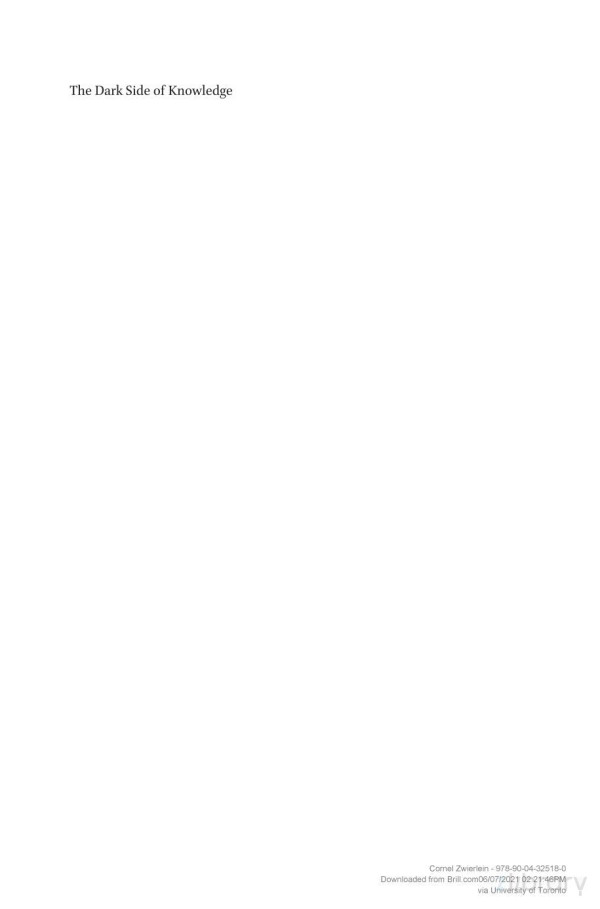

Most ebook files are in PDF format, so you can easily read them using various software such as Foxit Reader or directly on the Google Chrome browser.
Some ebook files are released by publishers in other formats such as .awz, .mobi, .epub, .fb2, etc. You may need to install specific software to read these formats on mobile/PC, such as Calibre.
Please read the tutorial at this link. https://ebooknice.com/page/post?id=faq
We offer FREE conversion to the popular formats you request; however, this may take some time. Therefore, right after payment, please email us, and we will try to provide the service as quickly as possible.
For some exceptional file formats or broken links (if any), please refrain from opening any disputes. Instead, email us first, and we will try to assist within a maximum of 6 hours.
EbookNice Team

Status:
Available0.0
0 reviews
ISBN 10: 9004325123
ISBN 13: 9789004325128
Author: Cornel Zwierlein
How can one study the absence of knowledge, the voids, the conscious and unconscious unknowns through history? Investigations into late medieval and early modern practices of measuring, of risk calculation, of ignorance within financial administrations, of conceiving the docta ignorantia as well as the silence of the illiterate are combined with contributions regarding knowledge gaps within identification procedures and political decision-making, with the emergence of consciously delimited blanks on geographical maps, with ignorance as a factor embedded in iconographic programs, in translation processes and the semantic potentials of reading. Based on thorough archival analysis, these selected contributions from conferences at Harvard and Paris are tightly framed by new theoretical elaborations that have implications beyond these cases and epochal focus.
Contributors: Giovanni Ceccarelli, Taylor Cowdery, Lucile Haguet, John T. Hamilton, Lucian Hölscher, Moritz Isenmann, Adam J. Kosto, Marie-Laure Legay, Andrew McKenzie-McHarg, Fabrice Micallef, William T. O´Reilly, Eleonora Rohland, Mathias Schmoeckel, Daniel L. Smail, Govind P. Sreenivasan, and Cornel Zwierlein.
Law and the Uncertainty of Value in Late Medieval Marseille and Lucca
Nescience and the Conscience of Judges: Religion’s Influence on Legal Procedure
Speaking Nothing to Power in Early Modern Germany: Peasant Silence in the Ius Commune
Coping with Unknown Risks in Renaissance Florence
(Non-)Knowledge, Political Economy and Trade Policy in Seventeenth-Century France
Ignorance in Europe’s State Financial Culture (Eighteenth Century)
Voluptas Carnis: Allegory and Non-Knowledge in Pieter Aertsen’s Still-Life Paintings
Humanist Styles of Reading in William Caxton’s Prologues and Epilogues
Coexistence and Ignorance: What Europeans in the Levant Did Not Read (ca. 1620–1750)
Ignorance about the Traveler: Documenting Safe Conduct in the European Middle Ages
International Crises as Experience of Non-Knowledge: The ‘Affairs of Provence’ (1589–1598)
Dealing with Hurricanes and Mississippi Floods in Early French New Orleans
‘Unknown Sciences’ and Unknown Superiors in Eighteenth-Century Secret Societies
Specifying Ignorance in Eighteenth-Century Cartography: Jean-Baptiste d’Anville
Semantics of the Void: Empty Spaces in Eighteenth-Century German Historiography
[Retracted] Non-Knowledge and Decision Making: The Challenge for the Historian
the dark side of knowledge
1001 dark nights the king
u don't know the power of the dark side
the dark side unit introduction
the dark side of evil
welcome to the dark side book review
Tags: Cornel Zwierlein, Dark, Knowledge